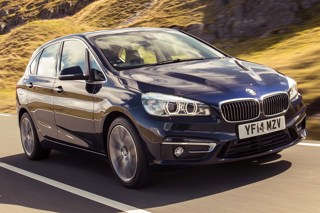Review
The BMW i3 must be the most eagerly awaited electric car since the Nissan Leaf was introduced in 2011.
Like the Nissan, the i3 is a purpose-built battery electric car. Looking like nothing else in the range, the i3’s avant-garde styling will certainly grab the attention of other road users as it travels along in silence, writes Simon Harris.
A compact four-seater with a plug-in range of up to 100 miles the i3 has been engineered with trademark BMW characteristics – it’s rear-wheel drive and has 50:50 front to rear weight distribution.
Include the £5,000 plug-in car grant and the purchase price is £25,680 for the base model. There are three themed interiors that basically function as equipment grades. Loft is £1,000 more than the standard car, Lodge is a £500 premium over Loft, and there’s another £500 step to choose the range-topping Suite.
All models come with Bluetooth, satellite navigation, LED daytime running lights, and 19-inch alloy wheels (20-inch wheels are an option).
The electric motor produces 170hp and 184-lbft of torque, the latter being available instantaneously and sufficient to propel the car from 0-62mph in 7.2 seconds. Extensive use of lightweight aluminium and carbon fibre components has also helped.
During my review of the car, I found the ride was quite firm (but less than expected) on the 20-inch wheels of the test cars, and the i3 has the fun-to-drive characteristics you’d expect in a compact BMW, with the added appeal of travelling in silence.
The gear selector is behind the steering wheel, and the interior is surprisingly spacious for a vehicle that’s shorter than a Mini Countryman.
As there is a significant amount of energy recuperation when lifting off the accelerator, it replicates engine braking and speed reduces as much as when applying the brakes gently. This saves brake wear, and the electric motor has fewer moving parts than an internal combustion engine.
The i3 has a typical range of around 80 to 100 miles between charges, although using maximum acceleration will reduce the available range. Customers can also specify a range-extender version that uses a 650cc motorcycle engine to continue charging the battery after the plug-in charge is depleted, offering a potential 186 miles until recharging or refueling, although the range extender was not available to test on the media event (but it is available from launch).
BMW i also offers a smartphone app, that guides you via public transport options (or on foot) for the remainder of your journey, assuming the destination for the i3 is the nearest public charging point rather than your place of work or the venue for your meeting.
BMW talks of ‘megacities’ as the places where the i3 works best.
The i3 impresses as the best battery EV to date, with the idea of integrated mobility firmly ingrained in all aspects of its design. It might take a while before the UK catches up with the infrastructure needs, but if EVs work for a customer's needs, the BMW is currently the best available.
There will be 47 sales agents for BMW i in the UK, many of which will be at current corporate hub dealers. There will be dedicated sales areas and expert staff, and these outlets will also be qualified to carry out maintenance on high-voltage components as well as the rest of the car.
A further 100 outlets will be able to carry out diagnostic and body repair work, and there will be two specialist centres for carbon fibre repair. However, BMW will cover the cost of any transfer between dealers. And by 2015 the manufacturer is expecting all its dealers to be capable of dealing with high-voltage components.
BMW claims its trials with electric prototypes, including the Mini E and the ActiveE, ensures it comes to market prepared for what customers need from electric vehicles. More than a quarter of a million miles were driven in electric vehicle trials in the UK.
There will be a single customer or driver helpline to deal with any query surrounding charging, and a facility where drivers would be able to swap to a conventional vehicle for a holiday that involved travelling long distances.
BMW says SMR costs for the standard model are around 22% lower than the 1-Series 118d, while the range-extender should be comparable to the 118d. Aluminium and carbon fibre have been used to help keep weight down, and the i3 tips the scales at less than 1,200kg. However, BMW has also been in consultation with Thatcham and the ABI to ensure they understand how the car is built to try to ensure insurance groups are no higher than necessary.
Factsheet
No information available.















